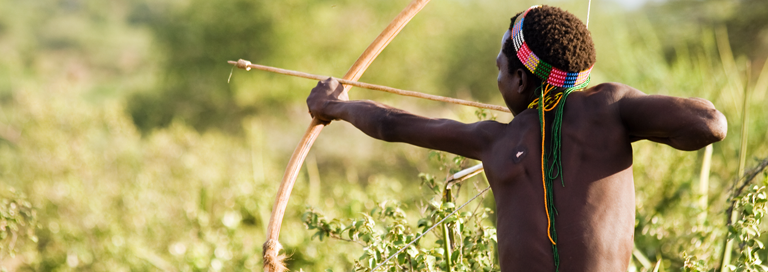Not long ago, I gathered my staff together in our conference room and asked if anyone would volunteer to get their microbiome tested.
KR immediately put her hand in the air.
I wanted to see how the gut of a random volunteer would compare to that of the Hadza tribe of Tanzania.
The Hadza are the healthiest, most disease-resistant people on the planet – with little to no heart disease, diabetes, osteoporosis, Alzheimer’s, Parkinson’s, colon cancer, colitis, or Crohn’s disease.1
Their secret?
Their microbiomes are the most diverse and disease-resistant in the world.
You see, the Hadza are one of the last hunter-gatherer tribes in the world – and the last remaining link to our ancient food background.
They practice no farming and still live as our ancestors did during 90% of human existence on earth.
And because their diet changes with the seasons, so do their gut microbe. Some bacteria disappear completely during the wet season, only to reappear again in the dry season.
In the wet season, the Hadza forage for berries and honey. During the dry season, they hunt.
This is important. It proves cha
nging your diet not only alters the composition of your microbiome but can also repopulate beneficial bacteria species that disappeared from the developed world generations ago.It also proves what I’ve been telling my patients for years – a primal diet leads to optimal health.
Putting KR on a gut-healthy protocol healed her troubled gut in just three days.2 And it can help yours as well.
Fix Your Broken Gut In 3 Days
Unfortunately, even though KR tries to make healthy food choices, her test results were typical of someone who eats an American diet.
Her test result wasn’t a disaster by any means. But, like most Americans – and others who eat a Western diet – it drastically lacked the diversity and protective power of the Hadza gut.
And that leaves people like KR vulnerable to disease.
But, yogurt and most probiotics won’t get you there. Here’s what worked for KR and my patients…
-
- Eat Foods That Contain Inulin: These indigestible prebiotic plant fibers are fermentable, which means when they’re broken down by gut microbes they create butyrate. This is what your microbial community needs to thrive. Good sources are bananas, asparagus, onions, garlic, leeks, and artichokes. But, your best source of inulin is chicory. The root of this blue-flowered perennial was used as a coffee substitute during WWII. It’s still a favorite in New Orleans.
- Add Some Seaweed: Microbes hitchhike into your gut on raw seaweed. Even cooked seaweed promotes the growth of good bacteria. Marine plants easily ferment in the digestive tract to release a fatty acid called butyrate that feeds your gut beneficial bacteria. You can buy several varieties of seaweed at health food stores and specialty grocers. Look for arame, kombu, nori, or wakame.
- Use The Right Probiotic. Most of these supplements are a waste of money. You see, probiotics are “live” bacteria. And during processing, heat and time kill off the bacteria in many of these products. The fact is probiotics won’t do you any good unless they make it to your gut. And the only kind that can do that use a delivery system that can survive stomach acid. Here’s what I told Rachel and my patients:
- Always check for gut survivability. The manufacturer should be using some form of “acid proof” technology that protects the organisms from your stomach acid.
- Look for CFU, or “colony forming units.” This is the number of bacteria that are expected to reach and then survive in your gut. The higher the number the better. A good target to shoot for is at least 30 billion CFU per capsule
- Don’t skimp on price. You really do get what you pay for. If it doesn’t meet the qualifications above, don’t waste your time or money. And remember to take them regularly. After a “loading dose” of once a day, most brands can be taken every 2 or 3 days thereafter. But don’t lapse. Keep feeding your microbiome what it needs.
To Your Good Health,

Al Sears, MD, CNS
References:
1. Stanford University Medical Center. “Hunter-gatherers’ seasonal gut-microbe diversity loss echoes our permanent one.” Science Daily, 24 Aug 2017.
2. Spector T. “What a hunter-gatherer diet does to the body in just three days .” CNN: The Conversation. July 5, 2017

